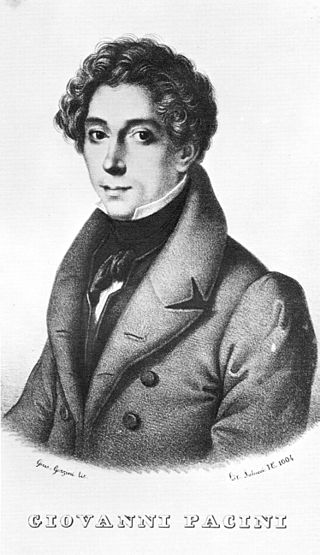
Giovanni Pacini was an Italian composer, best known for his operas. Pacini was born in Catania, Sicily, the son of the buffo Luigi Pacini, who was to appear in the premieres of many of Giovanni's operas. The family was of Tuscan origin, living in Catania when the composer was born.

Davide Perez was an Italian opera composer born in Naples of Italian parents, and later resident court composer at Lisbon from 1752. He staged three operas on librettos of Metastasio at Lisbon with huge success in 1753, 1754, and 1755. Following the 1755 Lisbon earthquake, Perez turned from opera mostly to church music.

Saffo is an opera in three acts by Giovanni Pacini set to a libretto by Salvadore Cammarano, which was based on a play by Franz Grillparzer, after the legend of the ancient Greek poet Sappho.
Domenico Fischietti (1725–1810) was an Italian composer.
La sposa fedele is an opera buffa in three acts by Pietro Alessandro Guglielmi. The Italian libretto was by Pietro Chiari.
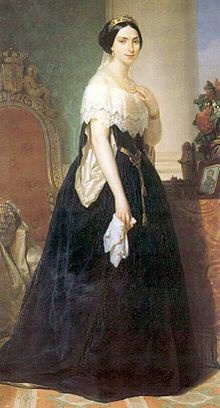
Adelaide Tosi was an Italian operatic soprano.

Medea is an opera in three acts composed by Giovanni Pacini to a libretto by Benedetto Castiglia. It premiered on 28 November 1843 at the Teatro Carolino in Palermo, conducted by the composer with Geltrude Bortolotti in the title role. The libretto is based on the plays Medea by Euripides and Médée by Pierre Corneille.
La Lodoiska is an opera in three acts by Simon Mayr to an Italian libretto by Francesco Gonella De Ferrari. It was Mayr's second opera and premiered at La Fenice in Venice on 26 January 1796.

Didone abbandonata is an opera in three acts composed by Domenico Sarro to a libretto by Pietro Metastasio of the same name which was based on the story of Dido and Aeneas from the fourth book of Virgil's Aeneid. The opera premiered on 1 February 1724 at the Teatro San Bartolomeo in Naples.
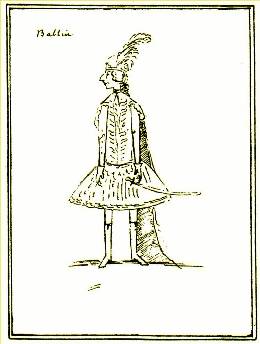
Annibale Pio Fabri, also known as Balino, from Annibalino, diminutive of his first name, was an Italian singer and composer of the 18th century. One of the leading tenors of his age in a time dominated by the castrati, Fabri is now best known for his association with the composer George Frideric Handel, in whose operas Fabri sang.

Semiramide riconosciuta is an Italian opera with serious action, or dramma per musica, by Nicola Porpora, set to a libretto by Metastasio with some textual changes, possibly by Domenico Lalli. The opera was written for some of the finest contemporary singers, and includes a technically demanding series of da capo arias.
Ezio is an opera eroica or "heroic" opera in 3 acts by Gaetano Latilla. The opera uses an Italian-language libretto by Pietro Metastasio. Metastasio's libretto was partly inspired by Jean Racine's play Britannicus and had earlier been set to music by George Frideric Handel in 1732. The work's protagonist is the fifth-century AD Roman general Flavius Aetius, returned from his victory over Attila. Latilla's version premiered at the Teatro di San Carlo in Naples on 10 July 1758. The composer both directed and conducted the production and Vincenzo Re designed the sets used in the premiere. The cast included Giovanni Carestini in the title role, Caterina Gabrielli as Fulvia, Maddalena Galli as Onoria, Caterina Galli as Valentiniano III, Gregorio Babbi as Massimo, and Antonio Ambrogi as Varo.
Giovanni Schmidt was an Italian librettist.
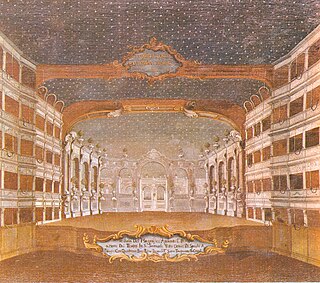
Teatro San Samuele was an opera house and theatre located at the Rio del Duca, between Campo San Samuele and Campo Santo Stefano, in Venice. One of several important theatres built in that city by the Grimani family, the theatre opened in 1656 and operated continuously until a fire destroyed the theatre in 1747. A new structure was built and opened in 1748, but financial difficulties forced the theatre to close and be sold in 1770. The theatre remained active until 1807 when it was shut down by Napoleonic decree. It reopened in 1815 and was later acquired by impresario Giuseppe Camploy in 1819. In 1853 the theatre was renamed the Teatro Camploy. Upon Camploy's death in 1889, the theatre was bequeathed to the City of Verona. The Venice City Council in turn bought the theatre and demolished it in 1894.

Siroe, or Siroe re di Persia, is an opera seria in three acts by Johann Adolph Hasse. The libretto was by Metastasio. As with many of the latter's libretti, Siroe was also set by Hasse's contemporaries, for example Vinci, Vivaldi and Handel.
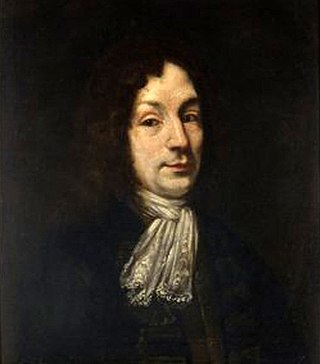
Luca Antonio Predieri was an Italian composer and violinist. A member of a prominent family of musicians, Predieri was born in Bologna and was active there from 1704. In 1737 he moved to Vienna, eventually becoming Kapellmeister to the imperial Habsburg court in 1741, a post he held for ten years. In 1765 he returned to his native city where he died two years later at the age of 78. A prolific opera composer, he was also known for his sacred music and oratorios. Although his operas were largely forgotten by the end of his own lifetime and most of their scores lost, individual arias as well some of his sacred music are still performed and recorded.
Domenico Gilardoni (1798–1831) was an Italian opera librettist, most well known for his collaborations with the composers Vincenzo Bellini and Gaetano Donizetti.

L'ultimo giorno di Pompei is an opera in two acts composed by Giovanni Pacini to an Italian libretto by Andrea Leone Tottola. It premiered to great success at the Teatro San Carlo in Naples on 19 November 1825 followed by productions in the major opera houses of Italy, Austria, France, and Portugal. When Pacini's popularity declined in the mid-19th century, the opera was all but forgotten until 1996 when it received its first performance in modern times at the Festival della Valle d'Itria in Martina Franca. L'ultimo giorno di Pompei influenced either directly or indirectly several other 19th-century works, most notably Karl Bryullov's 1833 painting, The Last Day of Pompeii.

Alessandro nell'Indie is a libretto in three acts by Pietro Metastasio. It was set to music around ninety times firstly by Leonardo Vinci, whose version premiered in Rome on 2 January 1730. The libretto was the fourth of five that Metastasio wrote for the Teatro delle Dame in Rome between 1727 and 1730. The work was dedicated to the Stuart pretender to the British throne, James Francis Edward Stuart, then resident in Rome.












